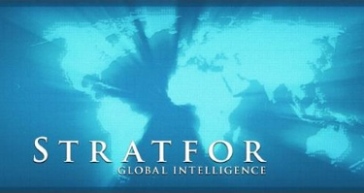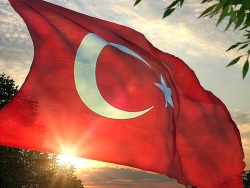Stratfor, 28 August 2015
 Summary: What lies in the future of the Middle East once the specter of an nuclear-armed Iran disappears (said tobe imminent every year since 1984)? Not peace, unfortunately. Stratfor describes what to expect in the next chapter of this misgoverned region.
Summary: What lies in the future of the Middle East once the specter of an nuclear-armed Iran disappears (said tobe imminent every year since 1984)? Not peace, unfortunately. Stratfor describes what to expect in the next chapter of this misgoverned region.
Summary
Tehran’s competitors in the region will not sit idly by without attempting to curb the expansion of Iranian influence. This will not manifest in all-out warfare between the Middle East’s most significant powers; Iran is not the only country well versed in the use of proxies. But the conflicts that are already raging in the region will continue unabated and likely only worsen. These clashes will occur on multiple fault lines: Sunni versus Shiite, for example, plus ethnic conflicts among Turks, Iranians, Arabs, Kurds, and other groups. The Iranian nuclear deal in the short term thus means more conflict, not less.
Turkey
 Stratfor has long predicted that the role of regional hegemon will eventually fall to Turkey, which boasts the largest economy in the Middle East and is strategically situated at the confluence of the Black Sea and the Mediterranean, on the Sea of Marmara. It is not a coincidence that what is now the Turkish commercial capital spent more than 1,500 years as the center of powerful empires, from 330 CE, when the Byzantine Empire was founded, until 1918, when the Ottoman Empire fell.
Stratfor has long predicted that the role of regional hegemon will eventually fall to Turkey, which boasts the largest economy in the Middle East and is strategically situated at the confluence of the Black Sea and the Mediterranean, on the Sea of Marmara. It is not a coincidence that what is now the Turkish commercial capital spent more than 1,500 years as the center of powerful empires, from 330 CE, when the Byzantine Empire was founded, until 1918, when the Ottoman Empire fell.
Like the United States, Turkey has some converging interests with Iran; its rivalry with its neighbor to the east is not a zero-sum competition. For one, Turkey depends on Iranian oil, which in 2014 made up 26% of Turkey’s oil imports. Lifting sanctions on Iran will offer Turkey’s commercial class, which is hungry for the potential economic returns, ample opportunity to invest.
Besides the economic links between the two powers, Tehran and Ankara also share some strategic interests. For example, both oppose the rise of an independent Kurdish state from the ashes of the Syrian civil war and the Iraqi conflict. While Tehran has at times offered military support to Kurds fending off the Islamic State in Iraq, Iran has a significant Kurdish population of its own, with estimates ranging anywhere from 6 million to 7 million people. Almost 15% of Turkey’s population is Kurdish, and Ankara has had to contend with Kurdish insurgency since 1984.
More broadly, however, Turkey and Iran are natural competitors. And even though Kurdish containment is a common interest between the rivals, the Kurds are also a useful tool for each to undermine the other. Thus, Kurdistan is the natural battleground between Turkey and Iran, and the two powers will use factions against one another as their competition increases. And though Turkey is predominantly Sunni and Iran predominantly Shiite, it is important to note that Ankara and Tehran seek to establish dominance over a region that is predominantly Arab. For many Arabs, choosing between Turkish or Persian rule is like choosing between death by drowning or by immolation.
Turkey’s relationship with the Islamic State is unclear; only in recent months has Turkey’s policy toward the militant group changed from passive acquiescence to active disruption. This may be because Turkey feels that Islamic State is becoming a domestic threat, with cells and operatives located across the country. Ankara may also have grown weary and frustrated with the fact that the West looks more favorably upon the prospect of Kurdish independence when it hears and sees that the Kurds seem to be the most effective force fighting the Islamic State.
Turkey has been adamant about seeing the downfall of Syrian President Bashar al Assad, actively supplying and training militants to fight Damascus. Ankara regards the Levant as its own sphere of influence, and it does not look kindly upon Iranian attempts to expand in the region. The possibility that Turkey will take a more active role in Syria also cannot be dismissed, especially in light of recent reports that Turkey is considering moving its military into northern Syria to create a buffer zone that would prevent Syrian Kurdish expansion and significantly weaken the Islamic State, enabling Sunni insurgents to focus their resources on continuing the assault on the al Assad government.
Saudi Arabia
Unlike Turkey, Saudi Arabia has relatively few if any shared interests with Iran. The kingdom is an Arab,Sunni power, and the Wahhabism sect of Islam to which most Saudis subscribe views Shiites with deep suspicion.
 With a Shiite minority making up between 10% and 15% of its population, and with Iraq no longer a bulwark against Iran’s ambitions, Saudi Arabia rightly sees itself on the front line of the conflict with Iran.
With a Shiite minority making up between 10% and 15% of its population, and with Iraq no longer a bulwark against Iran’s ambitions, Saudi Arabia rightly sees itself on the front line of the conflict with Iran.
That most of Saudi Arabia’s Shiite population lives in close proximity to the country’s massive oil fields, which are the source of Saudi wealth and power, makes the specter of Iranian expansion all the more alarming to Riyadh. As recently as 2011, Saudi Arabia sent troops into Bahrain to help put down unrest in the Sunni-ruled, Shiite-majority country, precisely because it feared Iran might use the situation to extend its reach in the Gulf.
Like Turkey, Saudi Arabia wants to see the downfall of the al Assad government, which would deal a crippling blow to Iranian influence in the region. For a time, the Saudis thought that the Islamic State could help them achieve that goal. That plan has backfired on Riyadh, as it must now deal with threats from both the Islamic State and al Qaeda. Still, Saudi Arabia continues tosupport other Sunni militants in Syria fighting against loyalist forces, and it, along with Jordan, is reportedly providing arms to Sunni tribes fighting in Iraq.
Unlike Turkey and Iran, Saudi Arabia has no immediate Kurdish problem, and Stratfor is already observing signs that the House of Saud will assist Kurdish elements in Iraq militarily. How far the Saudis will pursue this strategy, and which Kurdish factions the Saudis will support, is unclear. But the Iranians are already trying to provoke minority groups in Saudi Arabia, so the Saudis will likely at least attempt to embolden an autonomous Kurdistan capable of affecting regional economic and security issues — even though supporting the Kurds will mar Riyadh’s relationship with Ankara. After all, though both are Sunni powers, Saudi Arabia has almost as little interest in seeing Turkey dominate the Middle East as it does Iran.
In 2014, Saudi Arabia did attempt to start a diplomatic dialogue with Iran, but this effort quickly deteriorated with the beginning of the conflict in Yemen. With Riyadh focused on battling the Shiites and the Islamic State in the rest of the region, it was caught off guard when Iranian-backed Houthi rebels made significant military gains in Yemen, at one point even capturing Sanaa, the capital. Saudi Arabia has since committed air and land power to the conflict, and by April 2015 the tide had begun to turn. Since the six world powers agreed to a nuclear deal with Iran, Saudi-backed anti-Houthi forces in Yemen have won major victories in the Gulf of Aden.
These types of conflicts are already the norm across the region, and the rehabilitation of Iran’s international image coupled with Tehran’s desires to expand its domain will lead to more of the same.
Egypt
 Egypt, like Saudi Arabia, is an Arab, Sunni power, but one whose ability to act is much more constrained than Turkey or Saudi Arabia. Still, Cairo is an important part of the balance of power that the United States is trying to establish in the Middle East, as evidenced by Washington’s abrupt amnesia regarding the coup that ousted democratically-elected President Mohammed Morsi, a member of the Muslim Brotherhood, as soon as Iranian-backed forces in Yemen reared their heads in 2014. In addition, from the U.S. perspective, the Egypt-Israel Peace Treaty of 1979 remains one of the defining features of the region.
Egypt, like Saudi Arabia, is an Arab, Sunni power, but one whose ability to act is much more constrained than Turkey or Saudi Arabia. Still, Cairo is an important part of the balance of power that the United States is trying to establish in the Middle East, as evidenced by Washington’s abrupt amnesia regarding the coup that ousted democratically-elected President Mohammed Morsi, a member of the Muslim Brotherhood, as soon as Iranian-backed forces in Yemen reared their heads in 2014. In addition, from the U.S. perspective, the Egypt-Israel Peace Treaty of 1979 remains one of the defining features of the region.
Yet Egypt faces serious internal issues of its own, as it tries to roll back a subsidy regime, elect a parliament, contain social unrest, and manage multiple jihadist threats in the country, including disturbingly competent attacks in Cairo and the Sinai Peninsula. Despite this, Egyptian forces are also active in Yemen, and Egyptian President Abdel Fattah al-Sisi was in Russia this week to discuss economic ties and the situation in Syria with Russian President Vladimir Putin.
Egypt and Saudi Arabia have increased cooperation in recent months and may try to pool their resources to protect the Arab heartland of the Middle East. A joint Arab defense force under development could easily become part of this plan and is one of Cairo’s ways of attempting to maintain a prominent role in the regional alignment.
Overall, the Iran nuclear deal then will not mean less violence or war; it will mean more. The uprisings in the Arab world in 2011 created power vacuums across the region; proxies supported by outside powers, as well as local militias and groups, found new space in which to operate. Conflict in the region will become increasingly about Turkey, Iran, Saudi Arabia and Egypt using various groups to compete against one other, rather than groups taking advantage of failed states to carve out small fiefdoms of power and responsibility for themselves.
Aftershocks of the Iran Deal is republished with permission of Stratfor.

No comments:
Post a Comment